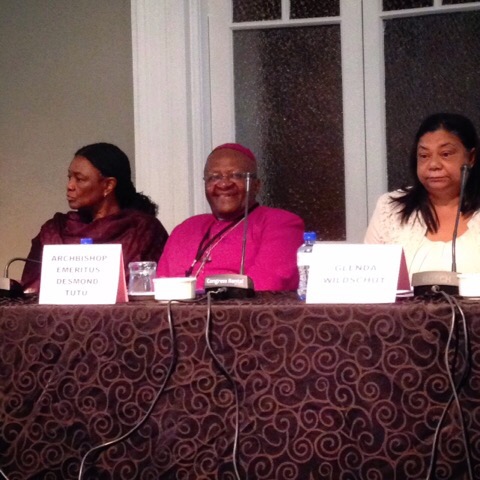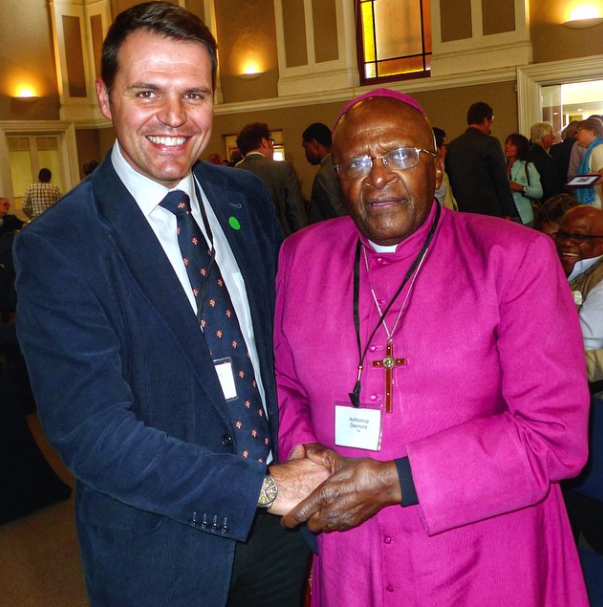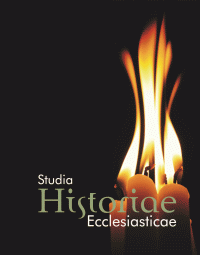As I write this I am sitting in a rather comfy seat in the JetBlue terminal at JKF airport in New York - it is thanksgiving, the busiest travel day of the year! In hindsight it might not have been all that wise to travel home today! Still, as I told a friend, I have flown through Lagos airport in Nigeria, which on a normal day makes JFK on Thanksgiving look like a quiet country airport! It is 5am here and the airport is bustling with people heading all over the USA to be with family and friends.
I arrived on an overnight cross-country flight from San Diego (we left there at 9pm last night). My next flight leaves JFK at 11am for Dakar, then from Dakar I go to Johannesburg and then from Johannesburg to Cape Town and home with my darlings!
The reason for this trip was to participate in the American Academy of Religion (AAR) and the Society of Biblical Literature (SBL) which took place in beautiful San Diego this year. I participated in three 'streams' of the AAR/SBL. Primarily I was in the Wesley Studies stream - on my first day I sat next to Douglas Meeks (who I have known for some years since first meeting him at Christ Church College, Oxford University in 2007), behind Randy Maddox (from Duke Divinity School, who I have also known for some years - probably as long as Douglas Meeks), and in front of Ted Campbell who I met while he was President of Garrett Evangelical Seminary in Chicago in 2005. The Wesley Studies sessions were great and it was wonderful to be a part of them and share a bit of a perspective from South Africa. I told the group about my research on Nelson Mandela and the Methodist Church of Southern Africa and it looks like this group may consider focussing on Wesleyan Public and Political Theology around the world as a result of that. I hope to be able to participate in that group in 2015 in Atlanta, Georgia. The point of interest is how John Wesley's theology in its various forms has made an impact on Public Theological discourse in different places in the world. Just this year I have seen how it has been received in Malaysia, in Brazil and of course in South Africa. I'm sure that it will make for some fascinating papers and discussion!
The other group that I participated in was Joerg Rieger's discussions on religion, economics and class (as part of the Theological Ethics stream). Joerg and I had dinner together on the 24th of November, it was great to catch up and hear of his work in Dallas and he new projects. His book 'Occupy Religion' was a point of discussion, and of course the reception of Liberation Theologies in his context and in ours.
One of the issues that I want to reflect on a lot more is the notion of class as a social differentiation. In one of the sessions there was a discussion on class, religion and economics and the point was made that in the United States (and so I guess in South Africa as well), we often collapse race and economics into one another. For example, if one were to do a demographic study of South African society it would be true to say that black South Africans are generally poorer than white South Africans because of the legacy of apartheid. Moreover, the wealthiest members of South African society are almost all white (of course that is changing rapidly with Black Economic Empowerment, but by and large it is still the case that white South Africans are among the wealthiest persons in the country, what the 'Occupy movement' have called the 1%). However, because we tend to associate and differentiate by race the middle class, or those with limited privilege tend to associate with their counterparts in the 1%. However, if we consider class, rather than race, as an economic differentiator we would very quickly see that the average white South African has more in common with his or her black South African counterparts than with the 1% (whether they be white or black). The illustration used in the sessions was that an American who earns $200 thousand per year has more in common with a poor person than with Bill Gates - simply stated they are in closer solidarity with the poor than with the 1%. This 'deep solidarity' as Joerg puts it requires a certain kind of response from the faithful Christian. When we are in solidarity with persons of our class it allows us to use our limited privilege to support people in our class and engage oppressive social and economic systems from a point of relative power (or at least more power than those who are less powerful than we are). This was an important thought for me.
I find it particularly poignant since we are launching a new movement in South African on the 2nd of December called the AHA movement (a movement of hopeful action that will facilitate creative and engaged conversation and thought around issues of poverty in South Africa).
Lastly, I participated in the Matthew studies group. It was wonderful to catch up on the most recent developments in Matthew Scholarship - even though there were no papers touching on the topic of my second PhD (Matthew 18 and forgiveness, intergroup contact theory). I had a chance to meet with my Doctoral Supervisor / Promotor, Prof Jan van der Watt from Radboud University. Ben Whiterington was also at that meeting.
Among the other persons that I met at this AAR/SBL meeting were Miroslaf Volf (I had a chat with him about the most recent research that I had been doing on faith and work. He was very kind to listen, comment and offer encouragement. Like many others who I met, however, he was most excited to know that I am from Stellenbosch University - people sure to love that beautiful place and are always keen to find an excuse to spend more time in beautiful Stellenbosch). I also met Prof Darrell Guder from Princeton who is visiting Stellenbosch in February 2015 for a missional theology conference we are hosting. It was also wonderful to spend some time with my friends Prof Wentzel van Huyssteen (also from Princeton) and Elizabeth Gerle (from Upsala, who is also a STIAS fellow and is keen to be back in Stellenbosch).
Then, it was so awesome to be in San Diego with my long time friend and colleague, Dr Wessel Bentley (and his son Matthew - such an amazing young man!) It was wonderful to have breakfast and catch up on the days events with Wes and Matt. They also seemed to have a blast. I am so encouraged by Wessel - not only is he a brilliant theologian and scholar, he has maintained great balance as a dad, bringing his son along to experience America and the AAR.
Then I attended papers by my good friends Dr Charlene van der Walt (in the feminist Biblical interpretation group - she is doing incredible work that is going to be a huge help to me in finishing this second PhD I am busy with), and Dr Retief Muller (in the African studies group). They were both fantastic. Profs Julie Claassens, Jeremy Punt, Lious Jonker and Elna Mouton were also there from Stellenbosch, as were Prof Ernst Conradie and Christo Lombaard from UWC, Jonathan Draper, Smanga Kumalo and Gerald West from UWC. It was also great to get to know Dr Jacob Meiring (from Pretoria) better. I also got to meet, for the first time, two friends that I have only known via social media - Dr Curtis Holtzen and Lisa Beth White. Curtis did his PhD at UNISA many years ago and we connected online around the institution. Lisa Beth is a United Methodist minister who has been very kind and encouraging over the years! She is completing a PhD in Mission at Boston - it was wonderful to finally meet her in person.
Another highlight was hearing former US President Jimmy Carter talking about religion, women and issues related to the environment. His basic message is that religion has an important role to play in shaping society for the better, and that two critical issues in our time that require our positive action are environmental stewardship and engaging gender inequality around the world.
So, all in all it was a wonderful opportunity to connect with old friends, make new friends, and think deeply and learn a lot!
One less good memory of the trip will be the darn cold I contracted on the flight over! My goodness, I felt poorly for most of the week and still don't feel great. However, that didn't stop me from grabbing a bicycle from the Kimpton Hotel Solamar where I was staying (a beautiful hotel!) and going for two rides around San Diego. On Sunday morning I did just over 30km's along the San Diego Harbour front from the Island to the mainland. The second ride was around 20km (on that day I was really not feeling well), where I rode up to Balboa park, it was so beautiful up there. I am impressed with the city of San Diego - beautiful people and a beautiful place.
All that being said, I cannot wait to be home with Megie, Courtney and Liam. I find that it becomes more and more difficult to travel without them! So, enough typing, time to find where my next flight boards and get home!
I have uploaded a few photographs from the trip with this post. I'm afraid they are not formatted since I am typing this post on my iPhone.
 Sunday, December 7, 2014 at 8:42AM
Sunday, December 7, 2014 at 8:42AM 


 On the 29th of January 2015 Megan and I will be married to one another for 21 years. This has been a period of such immeasurable grace. For both of us this will make the point in our lives where we have been together for as long as we were alive before marrying one another. My experience of marriage has been as a means of grace - in fact at times I have wondered whether it was not in fact a sacrament which communicates God's grace. We have rejoiced together, shared struggle, we have grown in our love and in maturity, we are blessed with children, we share our faith. It is a great blessing indeed. I found this letter below which was written by Tertullian a second century African Bishop to his wife. It is expresses so much of how I feel about Megan and our married life.
On the 29th of January 2015 Megan and I will be married to one another for 21 years. This has been a period of such immeasurable grace. For both of us this will make the point in our lives where we have been together for as long as we were alive before marrying one another. My experience of marriage has been as a means of grace - in fact at times I have wondered whether it was not in fact a sacrament which communicates God's grace. We have rejoiced together, shared struggle, we have grown in our love and in maturity, we are blessed with children, we share our faith. It is a great blessing indeed. I found this letter below which was written by Tertullian a second century African Bishop to his wife. It is expresses so much of how I feel about Megan and our married life.










